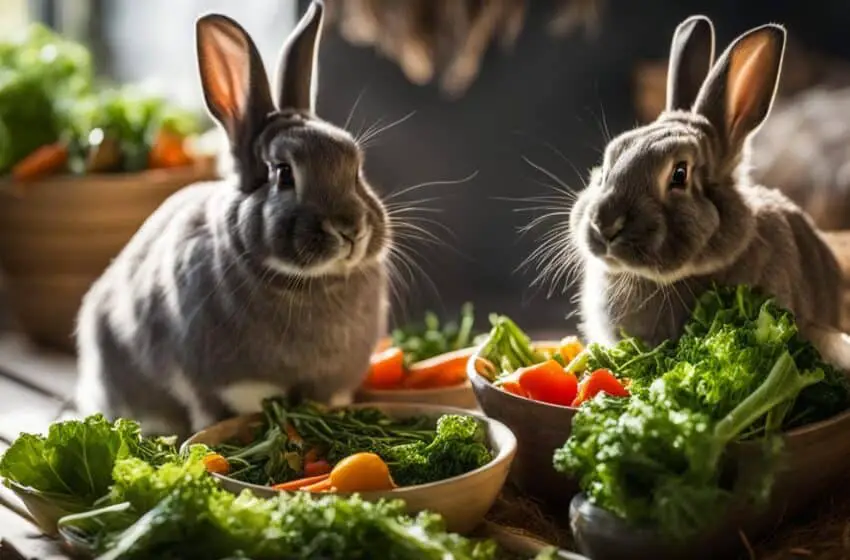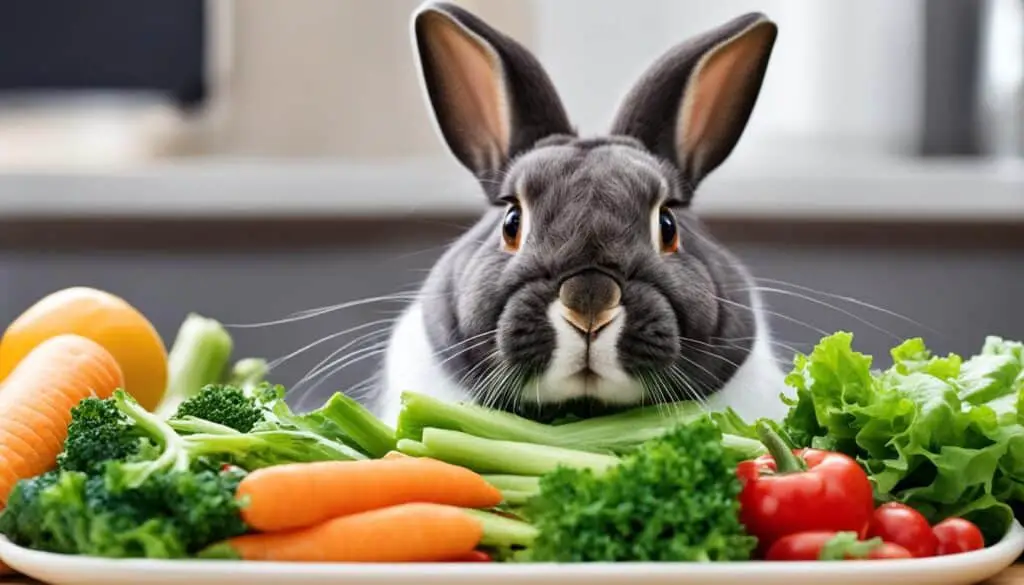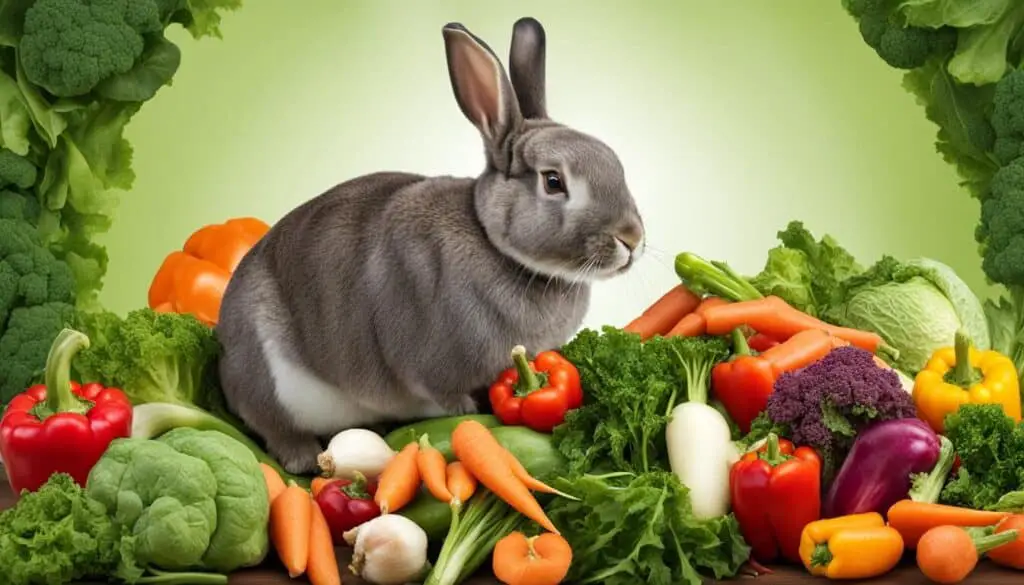Nutrition for Senior Rabbits: What You Need to Know

As rabbits age, their nutritional needs change, and it’s important to provide them with a diet that supports their health and vitality. Senior rabbits require a well-balanced diet that includes high-quality hay, fresh vegetables, and limited amounts of pellet food. It’s also crucial to monitor their water intake and ensure they have ample opportunities for exercise. By understanding the specific needs of senior rabbits, you can help them maintain their well-being as they age.
Key Takeaways:
- Senior rabbits have different nutritional needs compared to younger ones.
- A well-balanced diet for senior rabbits includes high-quality hay, fresh vegetables, and limited pellet food.
- Monitoring their water intake and providing opportunities for exercise is essential.
- Nutrition plays a crucial role in managing common health issues in senior rabbits.
- Consult with a veterinarian specialized in small animal care to ensure your senior rabbit’s nutritional needs are met.
The Importance of Proper Nutrition for Senior Rabbits
Proper nutrition plays a vital role in maintaining the health and vitality of senior rabbits. As rabbits age, their digestive system becomes less efficient, and they may be prone to dental problems and gastrointestinal issues.
Providing senior rabbits with a diet rich in fiber, such as Timothy hay, is essential for their overall well-being. Fiber promotes healthy digestion and helps prevent issues like hairballs and gastrointestinal stasis. Additionally, senior rabbits require a reduced calorie intake compared to younger rabbits to prevent obesity and associated health problems.
“Proper nutrition is key to ensuring the longevity and quality of life for senior rabbits. By providing them with a balanced diet that meets their specific needs, we can help prevent common health issues and ensure they live happy and healthy lives.” – Dr. Jane Smith, DVM
To further understand the importance of proper nutrition for senior rabbits, let’s take a closer look at the specific benefits it provides:
Promotes Healthy Digestion
Senior rabbits often experience a decline in their digestive efficiency, which can lead to gastrointestinal problems. A diet rich in fiber, such as Timothy hay, helps promote healthy digestion by supporting proper gut motility and preventing blockages. Fiber also helps maintain the health of the cecum, a vital digestive organ in rabbits.
Prevents Dental Problems
Dental issues are common among senior rabbits due to age-related changes in tooth structure and wear. Providing rabbits with hay to chew on helps wear down their teeth naturally, preventing overgrown teeth and associated dental problems. Additionally, offering dental chews specifically designed for rabbits can help maintain good oral health.
Manages Weight and Prevents Obesity
Senior rabbits have lower energy requirements compared to younger rabbits. Providing them with a reduced-calorie diet helps prevent obesity, which can lead to a range of health issues, including joint problems, cardiovascular disease, and a decrease in overall mobility. Monitoring portion sizes and limiting high-calorie treats is crucial for maintaining a healthy weight in senior rabbits.
Supports Overall Health and Vitality
Proper nutrition ensures senior rabbits receive the essential vitamins, minerals, and nutrients they need to thrive. A well-balanced diet contributes to a strong immune system, healthy fur, and optimal organ function, allowing senior rabbits to maintain their overall health and vitality as they age.
By prioritizing proper nutrition for senior rabbits, we can help them lead long, healthy, and fulfilling lives. The key is to provide a diet that supports their unique needs, promotes digestive health, prevents dental problems, manages weight, and supports overall well-being.
| Nutritional Benefits of Proper Nutrition for Senior Rabbits |
|---|
| Promotes healthy digestion |
| Prevents dental problems |
| Manages weight and prevents obesity |
| Supports overall health and vitality |
Overall, providing senior rabbits with proper nutrition is essential for maintaining their health and well-being. By understanding their specific dietary needs and implementing a well-balanced diet, we can ensure that senior rabbits live their golden years with optimal health and vitality.
Key Nutritional Needs for Senior Rabbits
Senior rabbits have specific nutritional needs that differ from younger rabbits. Meeting these needs is crucial to ensure their health and well-being as they age.
The main components of a senior rabbit’s diet include:
- High-quality hay:
- Fresh vegetables:
- Limited pellet food:
- Fresh water:
Hay should make up the majority of their diet and should be available at all times. It provides essential fiber that supports healthy digestion and helps prevent gastrointestinal issues. High-quality hay options for senior rabbits include Timothy hay, orchard grass, and oat hay.
Fresh vegetables should also be included in their diet in small amounts. Leafy greens like kale, collard greens, and romaine lettuce are excellent choices as they provide necessary vitamins and minerals. Remember to introduce new vegetables gradually to avoid gastrointestinal upset.
Pellet food should be limited to prevent obesity, as senior rabbits have a lower metabolism and are more prone to weight gain. Choose a pellet food specifically formulated for senior rabbits, as it will have the appropriate nutrient balance for their needs.
Lastly, ensure senior rabbits have access to fresh, clean water at all times. Proper hydration is essential for overall health and plays a vital role in maintaining proper organ function.
Remember to consult with a veterinarian who specializes in small animal care to ensure that your senior rabbit’s nutritional needs are being met. They can provide specific recommendations based on your rabbit’s individual needs and help address any health concerns that may arise.
As the saying goes, “You are what you eat,” and this holds true for senior rabbits too. By providing a well-balanced diet that meets their specific nutritional needs, you can help your furry friend enjoy a happy and healthy life well into their golden years.

Managing Health Issues in Senior Rabbits Through Nutrition
Nutrition plays a crucial role in managing common health issues that may arise in senior rabbits. As our furry friends age, they become more susceptible to certain health conditions that can be effectively addressed through a well-balanced diet. Here are some key health issues in senior rabbits and the nutritional strategies that can help manage them:
Dental Problems
Dental problems, such as overgrown teeth or tooth decay, are common in senior rabbits and can lead to pain, difficulty eating, and systemic infections. A proper diet that includes hay and appropriate dental chews can help maintain dental health. Hay, especially Timothy hay, promotes natural wear of teeth and helps prevent overgrowth. Dental chews made of high-fiber materials offer rabbits a chance to chew, which can help keep their teeth in good condition. Regular veterinarian check-ups are essential for monitoring dental health and addressing any concerns.
Gastrointestinal Issues
Senior rabbits are more prone to gastrointestinal issues, such as gas or stasis, which can cause discomfort and even life-threatening conditions if left untreated. A high-fiber diet is crucial in preventing gastrointestinal issues. Fiber-rich foods, like hay, promote healthy gut motility and prevent the formation of hairballs. Fresh water should always be available to help rabbits stay hydrated and maintain proper digestive function. Additionally, a veterinarian may recommend specific dietary adjustments, such as the introduction of probiotics or digestive enzymes, to support gastrointestinal health.
Obesity
Senior rabbits are at a higher risk of obesity due to decreased activity levels and metabolic changes. Obesity can lead to a range of health problems, including joint issues, heart disease, and diabetes. To prevent obesity, it’s important to monitor a senior rabbit’s calorie intake and provide appropriate portion sizes. A high-fiber diet that includes hay and limited amounts of pellet food can help regulate a rabbit’s weight. Regular exercise, such as supervised hopping or gentle playtime, is essential for maintaining muscle tone and overall health.
By addressing these health issues through nutrition, we can help senior rabbits lead comfortable and fulfilling lives. Proper dental care, a high-fiber diet, and weight management strategies are key components in supporting the health and well-being of our beloved senior bunnies.

Tips for Feeding Senior Rabbits
When it comes to feeding senior rabbits, it’s essential to understand and meet their specific dietary requirements. Here are some valuable tips to ensure your senior rabbit stays healthy and happy:
- Provide high-quality hay: Hay is a crucial component of a senior rabbit’s diet. It promotes proper digestion, dental health, and provides necessary fiber. Offer a variety of hays, such as Timothy, orchard grass, or oat hay, to keep them engaged and satisfied. Ensure hay is accessible at all times and replace it when soiled or depleted.
- Introduce fresh vegetables: Fresh vegetables offer essential nutrients and variety to a senior rabbit’s diet. Include leafy greens like kale, mustard greens, or romaine lettuce. Start with small amounts and gradually increase, observing any adverse reactions. Monitor their digestive health and adjust the vegetable choices accordingly.
- Limit pellet food: Senior rabbits have reduced calorie requirements, so limit their pellet intake to prevent obesity. Choose high-quality senior-specific pellets that are lower in protein and fat content. Pellets should complement a diet primarily composed of hay and vegetables.
- Ensure ample water supply: Hydration is vital for a senior rabbit’s overall health. Provide fresh, clean water in a spill-proof container that is easily accessible. Monitor water intake and consult a veterinarian if you notice any significant changes.
- Adjust portion sizes: Senior rabbits may require smaller portion sizes to maintain a healthy weight. Monitor their body condition and consult with a veterinarian to determine the appropriate portion sizes based on their age, weight, and activity level.
- Monitor digestion and dental health: Keep a close eye on your senior rabbit’s digestion and dental health. Look for signs of indigestion, such as a decreased appetite, bloating, or changes in stool consistency. Regularly check their teeth for any overgrowth or abnormalities that may affect their ability to eat properly.
Remember, each senior rabbit is unique, and their dietary needs may vary. Consult with a veterinarian experienced in rabbit care for personalized feeding recommendations and any specific health concerns. By providing a well-balanced diet and proper care, you can help your senior rabbit thrive in their golden years.
Conclusion
Providing proper nutrition for senior rabbits is crucial for maintaining their overall health and vitality. By understanding the specific nutritional needs of senior rabbits and adjusting their diet accordingly, we can help them age gracefully and prevent common health issues. It is advisable to consult with a veterinarian who specializes in small animal care to ensure that our senior rabbit’s nutritional needs are met.
Senior rabbits require a well-balanced diet that includes high-quality hay, fresh vegetables, limited pellet food, and ample access to clean water. Hay should make up the majority of their diet, as it provides essential fiber for healthy digestion and prevents gastrointestinal problems. Leafy green vegetables offer vital nutrients but should be given in small amounts. Monitoring their calorie intake is also necessary to prevent obesity and related health problems.
By prioritizing proper nutrition and providing the right care, senior rabbits can lead happy and healthy lives. It is essential to understand that their nutritional needs differ from younger rabbits, so it is crucial to adjust their diet to support their changing requirements. With a well-balanced and tailored diet, senior rabbits can thrive and enjoy their golden years with vitality.
FAQ
What are the specific nutritional needs of senior rabbits?
Senior rabbits require a well-balanced diet that includes high-quality hay, fresh vegetables, limited pellet food, and fresh water.
How much hay should I provide for my senior rabbit?
Hay should make up the majority of a senior rabbit’s diet and should be available at all times.
What types of vegetables are suitable for senior rabbits?
Senior rabbits should be offered small amounts of leafy green vegetables like kale, collard greens, and romaine lettuce.
How much pellet food should I give to my senior rabbit?
Pellet food should be limited to prevent obesity and should be specifically formulated for senior rabbits.
Are there any specific health issues that senior rabbits may face?
Senior rabbits may be prone to dental problems, gastrointestinal issues, and obesity.
How can I address dental issues in senior rabbits?
Dental problems can be addressed through a diet that includes hay and appropriate dental chews.
How can I prevent gastrointestinal issues in senior rabbits?
Providing a high-fiber diet and ensuring the rabbit has access to plenty of fresh water can help prevent gastrointestinal problems.
Why is monitoring calorie intake important for senior rabbits?
Senior rabbits may be more prone to obesity, so monitoring their calorie intake is crucial for maintaining their overall health.
Should I consult with a veterinarian for my senior rabbit’s nutrition?
It’s recommended to consult with a veterinarian who specializes in small animal care to ensure your senior rabbit’s nutritional needs are being met.



